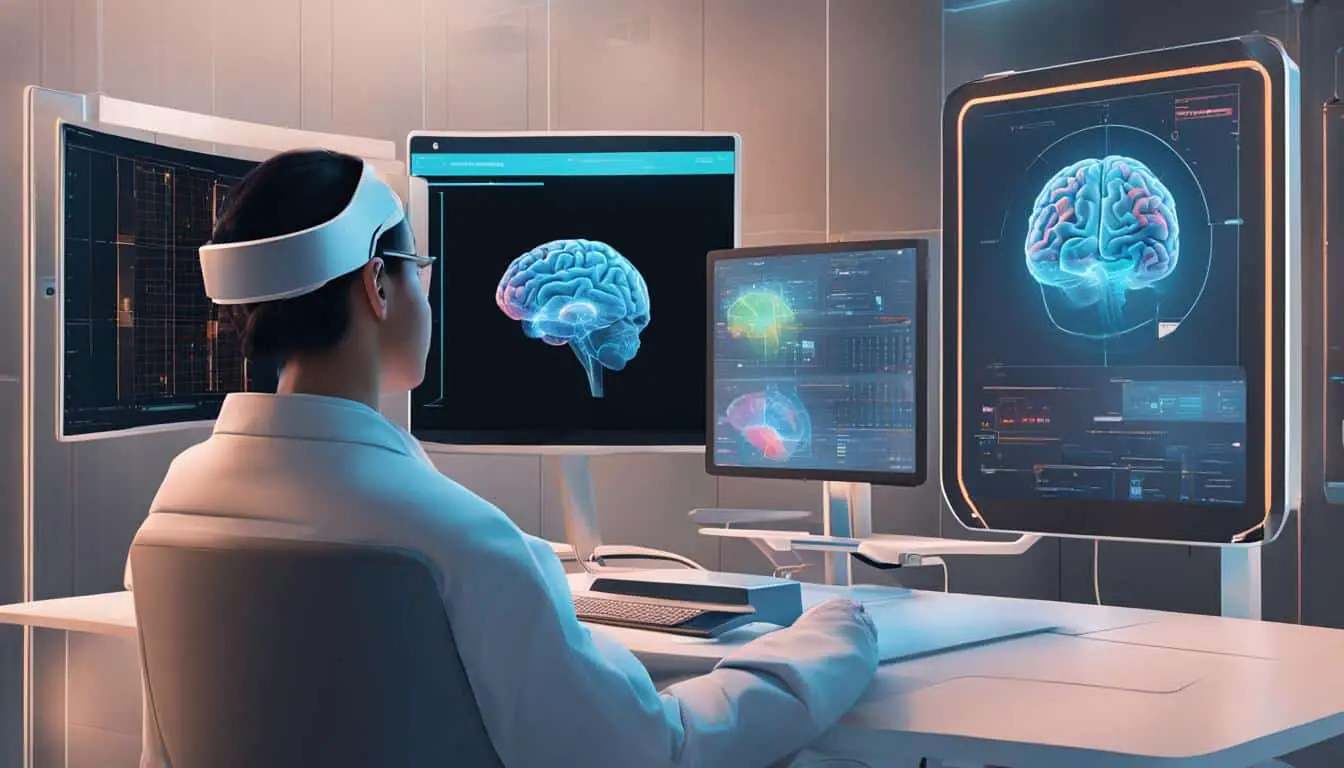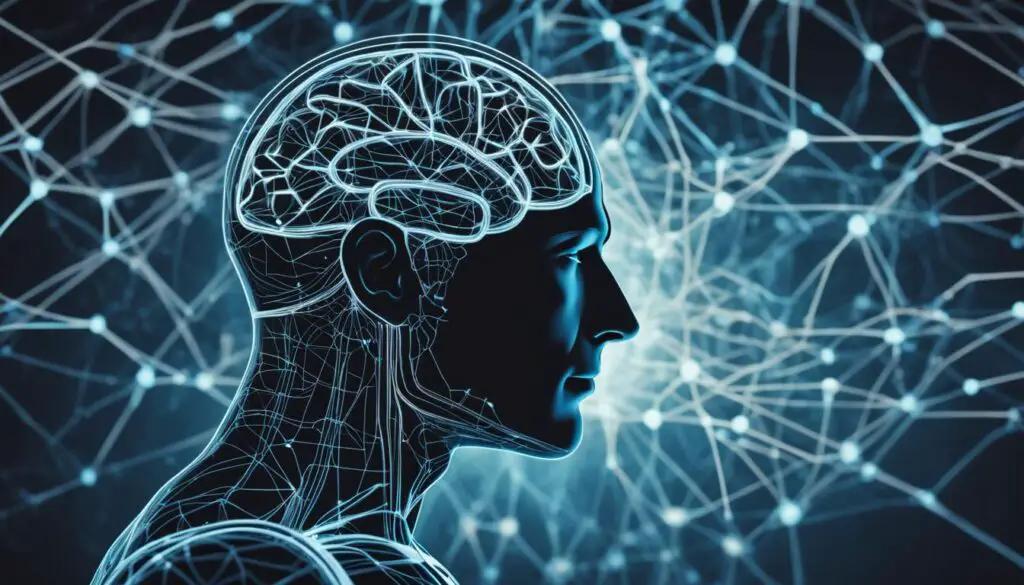
In recent years, there have been remarkable advancements in the field of mental health treatment, thanks to the breakthroughs in artificial intelligence (AI) technology. As AI continues to evolve and transform various industries, its potential in revolutionizing mental health care cannot be understated. By leveraging AI algorithms and data analysis, researchers and clinicians are developing innovative approaches that offer personalized care and improved outcomes for individuals seeking mental health treatment.
AI-powered mental health innovations are paving the way for more tailored treatment options. These innovations have the capability to analyze vast amounts of data, identify patterns, and predict treatment responses based on individual characteristics. By understanding each person’s unique needs and circumstances, AI enables clinicians to provide targeted interventions, enhancing the efficacy and precision of mental health care.
Key Takeaways:
- AI is revolutionizing mental health treatment by offering personalized care.
- By analyzing data, AI algorithms can tailor interventions to individual characteristics and needs.
- AI has the potential to enhance the efficacy and precision of mental health care.
- Personalized treatment options can lead to improved outcomes for individuals seeking mental health care.
- The use of AI in mental health care highlights the potential for innovative and effective approaches.
AI’s Role in Personalized Mental Health Treatment
AI technology has emerged as a valuable tool in the field of mental health treatment, providing personalized care for individuals. By analyzing large amounts of data, AI algorithms can identify patterns and predict treatment responses based on individual characteristics. This allows for more targeted and effective interventions, tailored to each person’s specific needs.
AI can also assist in early detection and intervention for mental health issues by analyzing behavioral patterns and identifying potential risk factors. Through continuous monitoring and analysis, AI algorithms can detect subtle changes in behavior that may indicate the onset of mental health conditions, enabling timely intervention and support.
One example of AI’s impact in personalized mental health treatment is the use of natural language processing (NLP) algorithms to analyze text-based data. By analyzing written or spoken text, AI can gain insights into a person’s emotional state, allowing for more accurate assessments and personalized treatment plans.
“The use of AI in mental health treatment offers the potential to improve access to care, provide more accurate diagnoses, and enhance therapeutic outcomes,” says Dr. Emily Sullivan, a leading expert in AI and mental health.
AI-driven chatbots and virtual assistants are also being integrated into mental health care settings, providing individuals with 24/7 support and guidance. These AI-powered tools can offer immediate access to resources, coping strategies, and therapeutic interventions, supplementing traditional therapy and enhancing overall treatment outcomes.
With AI’s ability to process and analyze vast amounts of data in real-time, mental health practitioners can make more informed decisions about treatment options, medication choices, and therapy approaches. This data-driven approach ensures that individuals receive personalized care that is tailored to their specific needs and circumstances.
The Benefits of AI in Personalized Mental Health Treatment
The utilization of AI in mental health treatment presents several key benefits:
- Improved Accuracy: AI algorithms can analyze complex data sets, leading to more accurate diagnoses and treatment plans.
- Enhanced Access to Care: AI-powered tools can bridge geographical barriers and deliver mental health support to underserved populations.
- Increased Efficiency: Automation of administrative tasks allows mental health professionals to focus on direct patient care and spend more time with individuals.
- Early Intervention: AI algorithms can detect early warning signs of mental health conditions, enabling prompt intervention and preventive measures.
By harnessing the power of AI, mental health treatment can become more targeted, efficient, and personalized, leading to improved outcomes and better overall care for individuals.
| AI in Mental Health Treatment | Benefits |
|---|---|
| Personalized Care | Tailored treatment plans based on individual characteristics and needs. |
| Early Detection | Identifying potential risk factors and detecting early signs of mental health conditions. |
| Enhanced Access | Breaking down geographic barriers and providing support to underserved populations. |
| Improved Accuracy | More accurate diagnoses and treatment decisions through data analysis. |
| Efficiency | Automation of administrative tasks, allowing more time for direct patient care. |
AI’s Impact on Mental Health Diagnosis
AI technology has revolutionized the field of mental health diagnosis, significantly improving accuracy and precision. By harnessing the power of AI algorithms, healthcare professionals can analyze a multitude of data points, such as medical records, patient-reported symptoms, and genetic information, to generate more precise diagnoses.
This innovative approach enables clinicians to make informed decisions about treatment options and tailor interventions to suit the unique needs of individual patients. With AI’s ability to process vast amounts of data quickly and efficiently, diagnoses can be made with greater accuracy, leading to more effective treatment outcomes.
“The integration of AI technology in mental health diagnosis has transformed the way we understand and approach mental health conditions. By analyzing objective data, AI algorithms offer a new level of diagnostic accuracy, helping to break down the stigma associated with mental health.” – Dr. Emily Johnson, Psychiatrist
Moreover, AI-powered mental health diagnosis reduces the reliance on subjective judgments, mitigating the potential for bias and providing a more objective assessment. This fosters trust between patients and healthcare providers, promoting transparency and fairness in the diagnostic process. It also contributes to destigmatizing mental health conditions by emphasizing the use of scientific analysis and evidence-based approaches.
By leveraging AI’s capabilities in mental health diagnosis, clinicians can gain invaluable insights into each patient’s unique needs, enabling them to develop personalized treatment plans. This personalized approach empowers patients by giving them more control over their mental health journey and enhancing their overall well-being.
The Role of AI in Mental Health Diagnosis:
- Analysis of various data points, including medical records, patient-reported symptoms, and genetic information.
- Generation of more precise and accurate diagnoses.
- Reduction of bias and subjectivity in diagnostic processes.
- Empowerment of patients through personalized treatment plans.
Through AI-driven mental health diagnosis, the field is moving toward more accurate assessments, individualized care, and improved treatment outcomes. This transformative technology represents a significant step forward in mental healthcare, offering hope for a brighter future in mental health diagnosis and management.

AI-Driven Therapeutic Interventions
AI-driven therapeutic interventions have the potential to revolutionize mental health treatment. By harnessing the power of artificial intelligence, innovative approaches are being developed to enhance the effectiveness of therapy and improve patient outcomes.
One such application is Virtual Reality (VR) therapy, which utilizes AI algorithms to create immersive and interactive environments that simulate real-life scenarios. This technology proves particularly beneficial for individuals struggling with anxiety disorders or phobias, as it allows them to gradually confront their fears in a controlled and supportive environment. Through virtual experiences, patients can develop coping mechanisms, build resilience, and overcome their psychological challenges.
Furthermore, AI-powered chatbots and virtual assistants are being integrated into mental health treatments to provide 24/7 support and guidance. These intelligent bots offer immediate accessibility to resources, coping strategies, and personalized advice, empowering individuals to manage their mental health effectively. With the ability to understand and respond to human emotions, these AI-driven companions play a crucial role in reducing the burden on healthcare providers and ensuring continuous support for individuals in need.
AI-driven therapeutic interventions have the potential to improve treatment outcomes by tailoring interventions to individual needs, increasing accessibility, and reducing the stigma associated with mental health issues. As technology continues to advance, these innovations hold immense promise for transforming the landscape of mental health treatment.
Ethical Considerations in AI Mental Health Treatment
While AI mental health treatment innovations offer great promise, it is essential to address the ethical considerations associated with their implementation. Two significant ethical concerns in AI mental health treatment are privacy and bias.
Privacy Concerns:
The collection and analysis of sensitive personal information in AI mental health treatment raise privacy concerns. As AI algorithms analyze vast amounts of data to provide personalized care, it is crucial to ensure the security and confidentiality of this data. Safeguarding patient privacy should be a priority, and steps must be taken to protect personal information from unauthorized access or breaches.
Bias in AI Algorithms:
AI algorithms used in mental health treatment rely on existing data, which may be biased, leading to potential unfair or inaccurate treatment outcomes. It is essential to continuously evaluate and mitigate biases in AI algorithms to ensure fair and unbiased treatment for all individuals. Ethical guidelines and regulations should be established to govern the development and use of AI in mental health treatment, promoting transparency and accountability throughout the process.
Table: Ethical Considerations in AI Mental Health Treatment
| Ethical Considerations | Description |
|---|---|
| Privacy Concerns | Collection and analysis of sensitive personal information |
| Bias in AI Algorithms | Risk of unfair or inaccurate treatment outcomes |
Image: Ethical Considerations

Integrating AI into Traditional Mental Health Care
The integration of AI into traditional mental health care has the potential to enhance the quality and efficiency of treatment. By leveraging AI algorithms, clinicians can make evidence-based decisions and apply relevant research and treatment guidelines to their practice. This integration can help reduce variability in treatment approaches and lead to improved outcomes for patients.
One of the key advantages of AI integration is its ability to automate administrative tasks, freeing up clinicians’ time to focus on providing personalized care. With AI technology handling administrative responsibilities such as appointment scheduling and documentation, mental health professionals can devote more attention to building strong therapeutic relationships and tailoring treatment plans to meet the unique needs of each individual.
The collaboration between AI systems and healthcare professionals enables a more comprehensive and holistic approach to mental health care. AI algorithms can analyze vast amounts of data, including patient histories, clinical research, and treatment outcomes, to provide clinicians with valuable insights. This data-driven approach empowers clinicians to make informed decisions and deliver more targeted interventions, leading to enhanced patient well-being.
By integrating AI into traditional mental health care, we can harness the power of technology to augment clinicians’ expertise and improve the overall quality of care. This partnership between human intelligence and artificial intelligence holds great promise for advancing mental health treatment and ensuring the well-being of individuals seeking support.
Benefits of AI integration in mental health care:
- Enhanced treatment quality and efficiency
- Reduced variability in practice
- Improved treatment outcomes
- Automation of administrative tasks
- Increased focus on personalized care
- Data-driven insights for evidence-based decisions
- Comprehensive and holistic approach to care
Challenges in integrating AI into traditional mental health care:
- Data privacy and security concerns
- Bias detection and mitigation in AI algorithms
- Ensuring equitable access to AI-driven services
- Ethical considerations in the use of AI technology
Case Study: Integrating AI in a Mental Health Clinic
In a recent study conducted at a mental health clinic, researchers implemented an AI system to assist clinicians in treatment decision-making. The AI system analyzed patient data, including demographic information, medical histories, and treatment responses, to suggest personalized interventions. The study found that the integration of AI into the clinic’s workflow resulted in improved treatment outcomes and increased efficiency in care delivery. Clinicians reported that the AI system complemented their expertise and enhanced their decision-making process.
| Benefits | Challenges |
|---|---|
| Improved treatment outcomes | Data privacy concerns |
| Enhanced clinician decision-making | Bias detection and mitigation |
| Increased efficiency in care delivery | Equitable access to AI-driven services |
Future Directions and Challenges
In the rapidly evolving field of AI mental health treatment, the future holds great promise for innovation and advancement. Ongoing research and development in AI algorithms and technologies are expected to further enhance treatment outcomes and expand the scope of personalized care.
Continued efforts in AI-driven mental health treatment have the potential to revolutionize the way we approach diagnosis and therapeutic interventions. By leveraging AI’s predictive capabilities and data analysis, we can unlock new insights and develop more effective treatment strategies. This tailored approach has the potential to improve patient outcomes and provide personalized care for individuals seeking mental health support.
However, it is crucial to recognize and address the challenges that accompany AI implementation in mental health care. Three key challenges stand out as we navigate the future of AI mental health treatment:
- The Need for Robust Data Privacy Measures
- Addressing Bias in AI Algorithms
- Ensuring Equitable Access to AI-driven Mental Health Services
1. The Need for Robust Data Privacy Measures
As AI relies heavily on data collection and analysis, ensuring robust data privacy measures is of paramount importance. Safeguarding sensitive personal information is crucial in maintaining patient trust and confidentiality. Healthcare organizations must prioritize data security and develop comprehensive privacy protocols to protect patient data from unauthorized access or potential breaches. Striking a balance between utilizing data for innovation and respecting individual privacy is vital for the responsible development and implementation of AI technology in mental health treatment.
2. Addressing Bias in AI Algorithms
While AI algorithms have the potential to vastly improve mental health diagnosis and treatment, they can also inherit biases present in the data they are trained on. These biases can disproportionately impact marginalized communities, perpetuating inequities in diagnostics and treatment interventions. To ensure fair and unbiased AI-driven mental health care, proactive steps must be taken to identify and mitigate bias in AI algorithms. Regular evaluation and monitoring are necessary to continuously improve algorithm fairness and equity.
3. Ensuring Equitable Access to AI-driven Mental Health Services
Wide-scale adoption and implementation of AI-driven mental health services should not exacerbate existing healthcare disparities. It is imperative to ensure equitable access to AI-based interventions and programs for all individuals, including underserved populations who may have limited access to resources and technology. Addressing the digital divide and providing equal opportunities for all to benefit from AI mental health treatments requires collaborative efforts and policy initiatives that bridge socioeconomic gaps.
Collaboration between researchers, clinicians, policymakers, and technology developers will be crucial in addressing these challenges and maximizing the potential benefits of AI mental health treatment innovations. By working together, we can harness the full power of AI in transforming mental health care and create a future where personalized, accessible, and effective care is available to all.
Conclusion
AI mental health treatment innovations offer new horizons for personalized and effective care in the field of mental health. The breakthroughs in AI algorithms and technologies have the potential to revolutionize diagnosis, therapeutic interventions, and the integration of AI into traditional mental health care.
While ethical considerations and challenges need to be addressed, the future prospects for AI in mental health treatment are promising. By harnessing the power of AI, we can create a healthcare landscape that is more accessible, personalized, and responsive to the unique needs of individuals seeking mental health care.
With AI, mental health treatment can be tailored to the individual, considering their specific characteristics and needs. AI algorithms can analyze large amounts of data to predict treatment responses, leading to more targeted interventions and improved outcomes. Additionally, AI technology can assist in early detection and intervention, helping individuals receive the care they need at the right time.
As we move forward, it is crucial to address ethical considerations and challenges associated with AI mental health treatment. Privacy concerns must be prioritized, ensuring the security and confidentiality of sensitive personal information. Efforts should also be made to mitigate bias in AI algorithms, ensuring fair and unbiased treatment for all individuals. By collaboratively addressing these challenges, we can unlock the full potential of AI in mental health treatment and provide personalized care that positively impacts the lives of those in need.
FAQ
How can AI technology be used in mental health treatment?
AI technology can be used in mental health treatment to provide personalized care for individuals. It can analyze large amounts of data to identify patterns and predict treatment responses based on individual characteristics, allowing for more targeted and effective interventions.
What are the advantages of using AI in mental health diagnosis?
The use of AI in mental health diagnosis can improve accuracy by analyzing various data points such as medical records, patient-reported symptoms, and genetic information. This can help clinicians make informed decisions about treatment options and tailor interventions to individual patients.
How can AI-driven therapeutic interventions benefit mental health treatment?
AI-driven therapeutic interventions, such as virtual reality therapy and AI-powered chatbots, can revolutionize mental health treatment by providing immersive environments for therapy and 24/7 support and guidance. These interventions have the potential to improve treatment outcomes, increase accessibility, and reduce the burden on healthcare providers.
What ethical considerations should be addressed in AI mental health treatment?
Privacy concerns and the risk of bias in AI algorithms are important ethical considerations in AI mental health treatment. Steps must be taken to ensure the security and confidentiality of personal information and to continuously evaluate and mitigate biases to ensure fair and unbiased treatment for all individuals.
How can AI be integrated into traditional mental health care?
AI algorithms can assist clinicians in making evidence-based decisions by providing relevant research and treatment guidelines. AI technology can also automate administrative tasks, allowing clinicians to spend more time with patients and provide personalized care.
What are the future directions and challenges of AI in mental health treatment?
Future directions of AI in mental health treatment include continued research and development to enhance treatment outcomes and expand personalized care. However, challenges such as data privacy, bias in AI algorithms, and equitable access to AI-driven services need to be addressed.
What are the prospects for AI in mental health treatment?
AI mental health treatment offers new horizons for personalized and effective care. By harnessing the power of AI, we can create a healthcare landscape that is more accessible, personalized, and responsive to the unique needs of individuals seeking mental health care.








